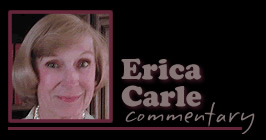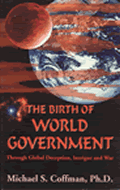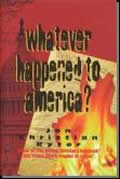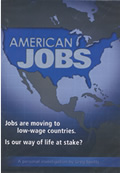Other Carle Articles:
Government
Religion In The
United States
The
Chamber Of Commerce:
It's Power And Goals
Control The Environment To Control Humanity
Universal Brotherhood And The Drive For World Unity
WHAT IS FREEDOM?
Erica
Carle
January 26, 2005
NewsWithViews.com
I did not understand President Bush�s inauguration speech. He used the word �freedom� twenty-seven times, but what freedom means to him was not clear. Words can mean different things to different people and freedom is an example of that. To some people freedom means no responsibility. To others it means having power and ability to assume responsibility. Is it freedom to be taken care of, or does freedom mean to be able to take care of oneself? Is a baby free before it is born when it has no responsibility for its own physical needs, or is it free when it has been released from the confinement of the womb and must begin to do for itself? Does freedom mean we are free to use the Bible as a guide to our behavior? Or does it mean freedom from God?
"Freedom" is a good word, but it cannot stand alone. It needs an implied or stated explanation and that was not evident in President Bush�s speech. When a prisoner is allowed to leave his place of confinement, he gains his freedom from jail. Those who knew that he was imprisoned would understand his new situation if they were told he gained his freedom, because jail is implied. A recently divorced man or woman might say, "I'm free!", but only those who knew the situation would understand that they meant free of the obligations of marriage. On the last day of school in spring the children shout that they are free. They mean they are free from the necessity of going to school. They are free to play and have fun. If a merchant gives you a gift with no strings attached you might say it was free of cost or obligation. If you no longer hurt, you have freedom from pain. When our country was born its first citizens said they were free. They meant their country was free from the political domination of England.
People use the words, "free" and �freedom� to mean many things. �Free� is even heard at funerals, especially when a person has suffered in his lifetime: "At last he is free!" In this case "free" means freedom from pain and suffering, but it also means dead. What about freedom from want and fear? Couldn�t that mean the same thing as freedom from pain and suffering? Couldn�t it also mean dead? What about being free to have an abortion? That certainly does mean freedom to make someone dead.
In the Western world we often speak of personal freedom, but here, too, the meaning is vague. The idea of personal freedom is a subjective concept. A situation of freedom to one person can seem like unbearable bondage to another. I have two relatives from one family whose ideas on personal freedom are totally different. The sister likes to travel, meet new people, participate in group activities, and face new challenges. She is married to a man whose work provides many such opportunities. She is happy and emotionally comfortable with her choice. If she had to live all her life on the farm where she was born, and see mostly the people she had known in her own community she would be miserable.
Her brother, no less intelligent, owns a farm and loves farming. He enjoys being in surroundings familiar to him since childhood. Even a single day's journey away from his beloved land is a chore and a burden to him. His idea of freedom is staying close to home. Both of my relatives live lives of freedom because they were able to choose the type of life they wanted to live. Their concepts of freedom involved choices, and those choices were personal and emotional.
How far does personal freedom go? Does personal freedom mean believing, doing, and saying whatever we wish to believe, do, or say, whenever or wherever we wish--having no obligations to anyone? Some would claim their right to total release from all laws, rules, and obligations. Living with those who have this total concept of freedom could be extremely unpleasant and perhaps dangerous.
President Bush seems to believe that democracy means freedom. He said it is the policy of the United States to seek and support the growth of democratic movements and institutions in every nation and culture, with the ultimate goal of ending tyranny in our world. Does this leave United States citizens in a state of freedom? Or has the President placed a perpetual burden on citizens of his own country? Does freedom mean we must accept every burden we are told to bear and every restriction that this all-encompassing concept of freedom demands?
In the Bush speech we were also told that there now is a broader definition of liberty. That also troubles me. What it seems to mean is that the government is always at liberty to give away, rather than sell public lands and public goods, as was done following the Homestead Act. It means that the government is at liberty to control citizens� retirement savings since the passage of the Social Security Act. It means the government was at liberty to give veterans extra compensation for their service only if they used that compensation for education, as was the case with the GI Bill of Rights.
And I do not understand what President Bush meant when he said, �We will widen ownership of homes and businesses, retirement savings and health insurance.� Did he mean more individuals would own homes and businesses? Or did he mean that individual ownership would be widened and eventually give way to communal ownership? I don�t know. Do you?
The concept of self government was discussed in the speech, but not clarified. I know that there are philosophers and writers who sincerely believe there is no such thing as individual self government or human freedom because humans are merely biological automata or robots who have no real control over their own thoughts, feelings, and actions. These materialist thinkers believe that everything we do can be explained by material causes. Heredity and environment account for everything. They deny the directing and controlling power of the will. This materialist concept is used to justify the notion that environmental influences should be set up for the masses and controlled by social, psychological, political, and economic �scientists.�
President Bush used the word freedom twenty seven times and the word liberty more than a dozen. I have heard it said that he made a wonderful speech, but to me it seemed to be full of contradictions. I do not really know what freedom and liberty mean to our President, and it worries me.
� 2005 Erica Carle - All Rights Reserved
Erica Carle is an independent researcher and writer. She has a B.S. degree from the University of Wisconsin. She has been involved in radio and television writing and production, and has also taught math and composition at the private school her children attended in Brookfield, Wisconsin. For ten years she wrote a weekly column, "Truth In Education" for WISCONSIN REPORT, and served as Education Editor for that publication.
Her books are GIVE US THE YOUNG--$5 Plus $2.00 P&H WHY THINGS ARE THE WAY THEY ARE--$16 PLUS $4.00 P&H BOTH BOOKS -- $25 Total. A loose leaf collection of quotes titled, SIX GENERATIONS TO SERFDOM is also available--$15 Plus $2.00 P&H. Mailing address: Erica Carle; PO Box 261; Elm Grove, WI 53122.
E-mail: ericacarle@sbcglobal.net
President Bush seems to believe that democracy means freedom. He said it is the policy of the United States to seek and support the growth of democratic movements and institutions in every nation and culture, with the ultimate goal of ending tyranny in our world.










